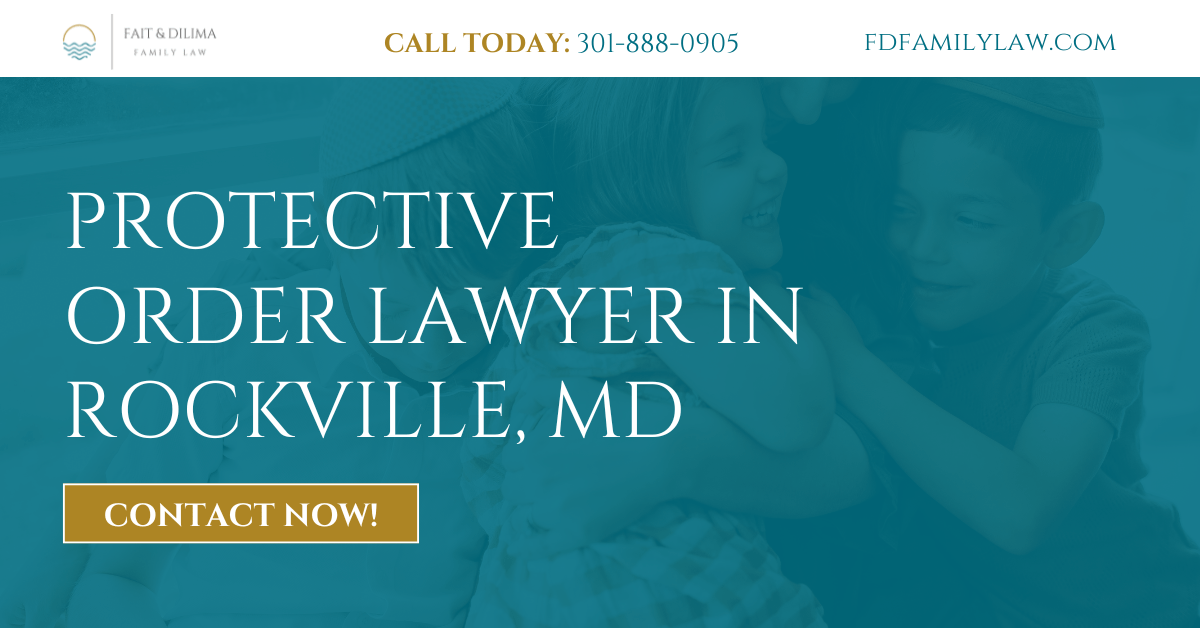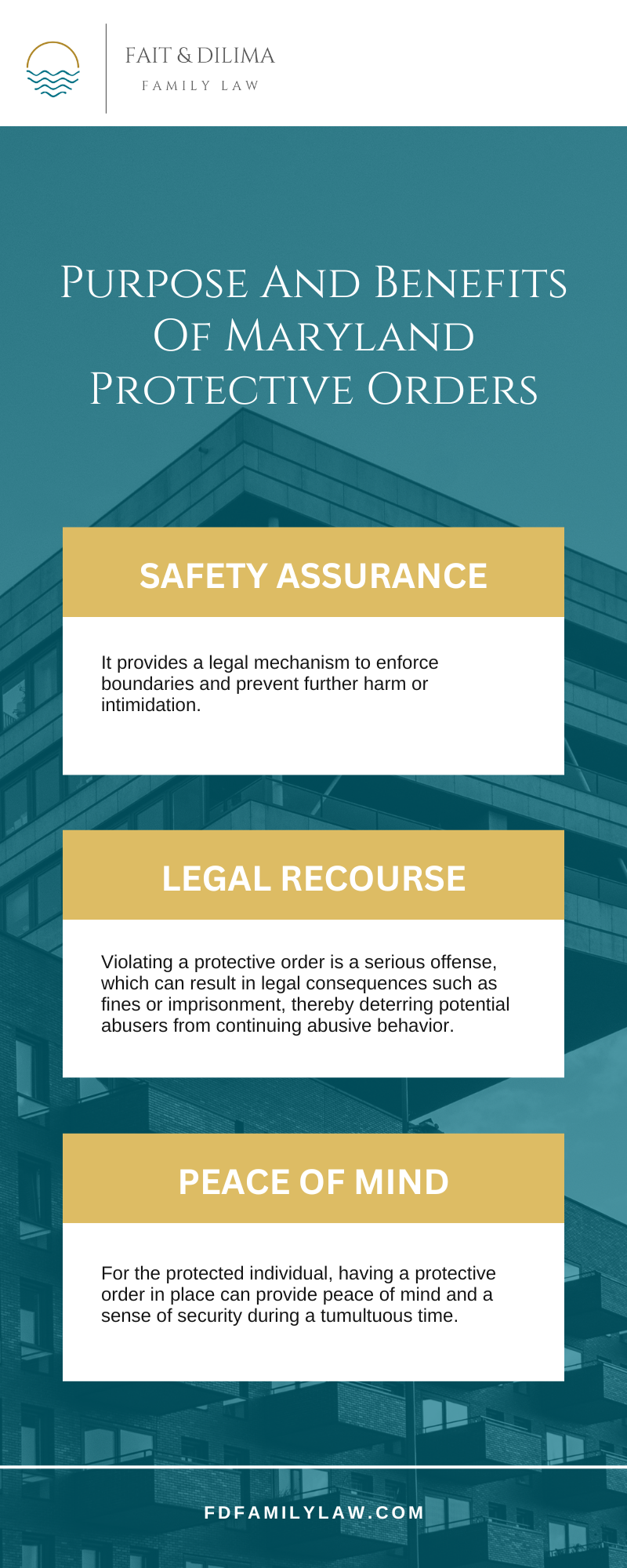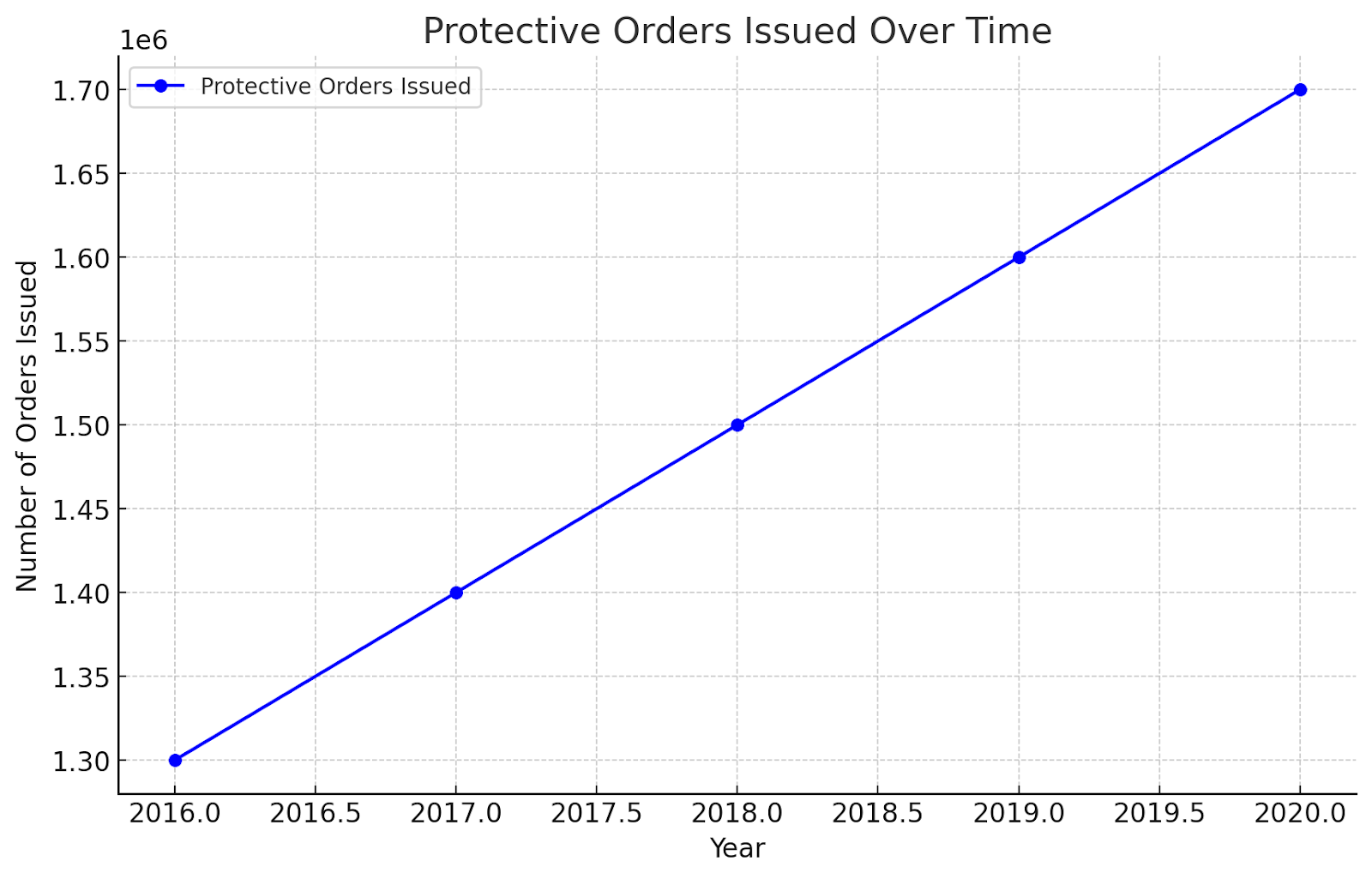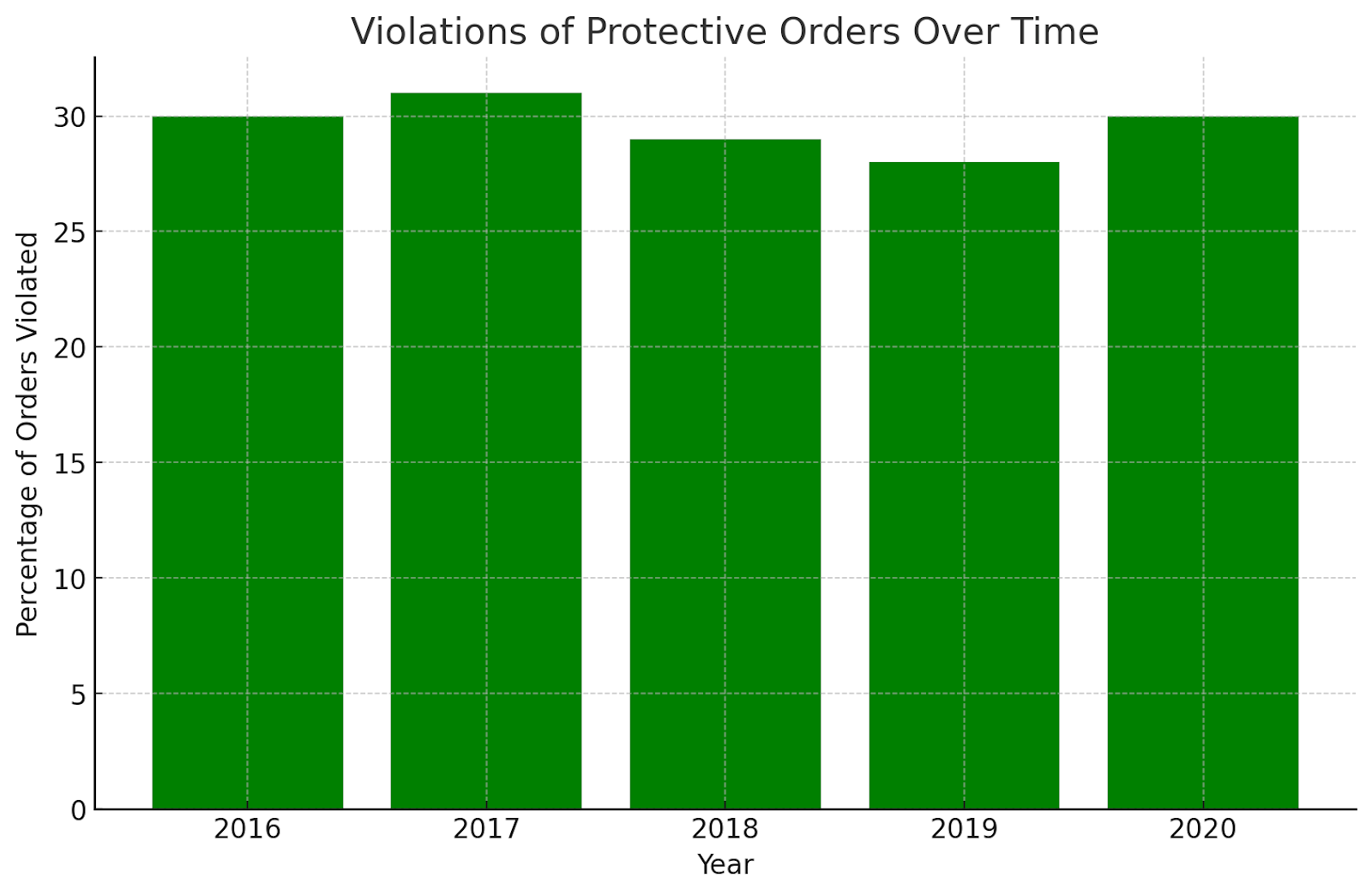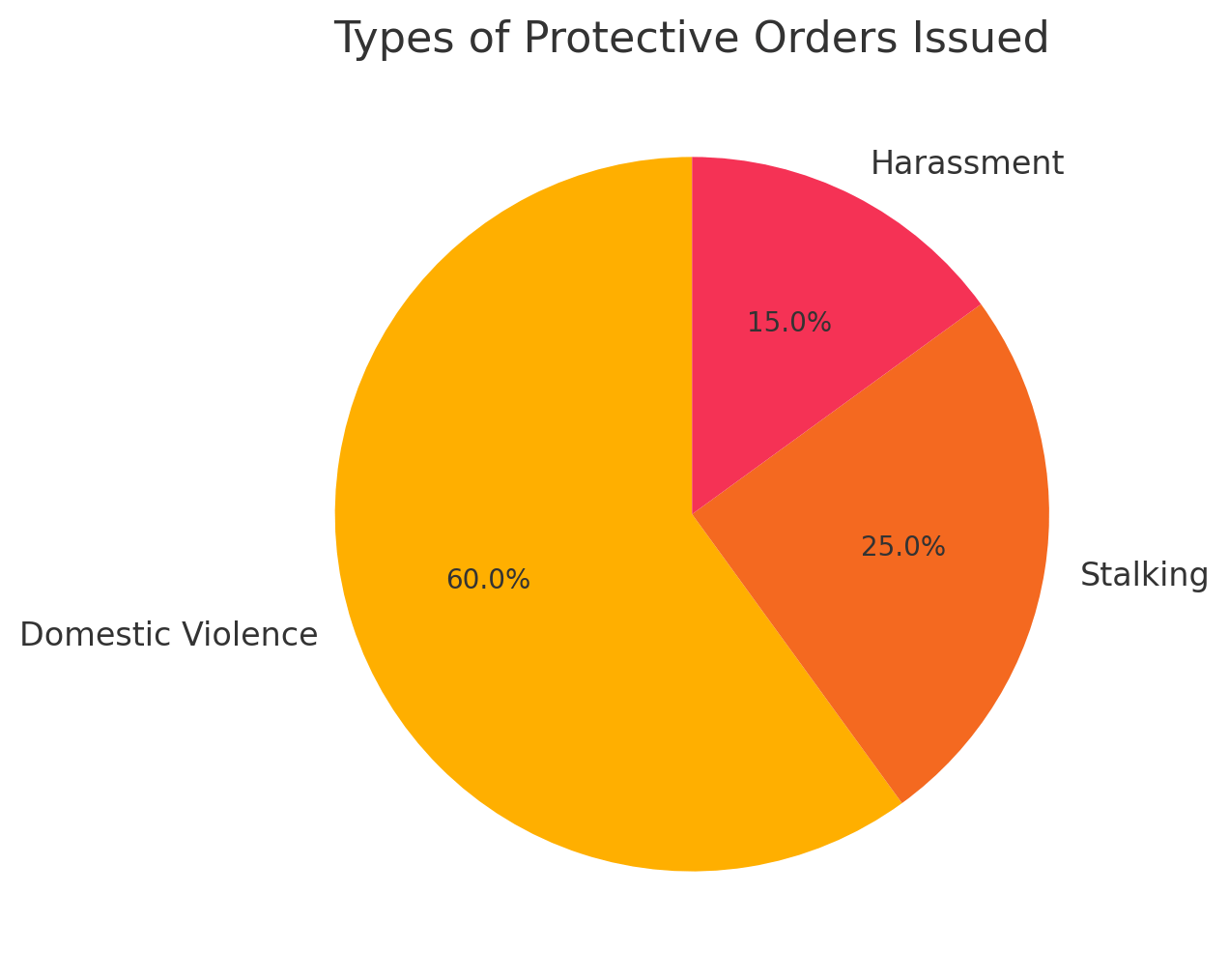Rockville Protective Order Lawyer
Fait & DiLima, LLP helps clients place protective orders to prevent domestic violence and abuse.
Protective Order Lawyer in Rockville, MD
A home is a refuge. It should be a safe space for any person. Whether you are a man, woman, or child, the home offers you a place where you know you are protected. However, there are instances when peace and order inside your house are shattered.
The purpose of a protective order is to give you peace of mind against a spouse or relative threatening your home.
If you need help with a protective or peace order, turn to the Fait & DiLima, LLP team. Schedule a consultation with our Rockville, MD protective order lawyer to understand your legal options.
Understanding Protective Orders
If you find yourself in a violent situation at home, you must take action to protect yourself and your family. The state offers two types of orders:
- A peace order is designed to protect against another person not living in the same house as the victim. Any abuse from a stranger, neighbor, or acquaintance falls into this category.
- A protective order is designed for violence committed by someone in the same home as the victim. That could be your dangerous spouse, a person with whom you have a common child, or someone you have lived with in the past 90 days.
Process To Get A Protective Order
Maryland offers three types of protective orders:
- Interim protective order
- Temporary protective order
- Final protective order
You can obtain an interim protective order from a court commissioner in any county within the state. It is possible to get one without the other party or abuser knowing about it. You will then get a hearing for a temporary protective order within 48 hours.
Another hearing will be set if you get a temporary protective order. That will be for the final protective order. During this time, the alleged abuser has the opportunity to offer their defense. The protective order is valid for up to a year and can be renewed if deemed necessary by the courts.
The judge can impose different orders if the abuse is proven. These include ordering the abuser to keep away from the victim, granting child custody to the victim, and ordering the abuser to make payments.
Penalties For Violating A Protective Order In Maryland
The penalties for violating a protective order depend if there are aggravating factors. An abuser can break the order while committing another crime against you. The new crime is considered an aggravating factor.
If there’s a violation of a protective order, the judge can impose jail time of up to 90 days for the first offense. The penalty will increase for succeeding offenses. A phone call or text message can violate a protective order for no contact.
If the judge finds a crime committed when the order was violated, like assault, the penalty imposed would be based on the aggravating factor. Penalties for such crimes are typically higher than 90 days of imprisonment.
What A Protective Can Order Do In A Divorce
A protective order, often referred to as a restraining order or an order of protection, serves an influential role in divorce proceedings where there are concerns about safety, harassment, or domestic violence. This legal document is issued by a court to protect individuals from harm or harassment by another party, typically a spouse or partner.
If you’re going through a contentious divorce or separation from your partner, or you otherwise feel unsafe, our protective orders lawyer from Fait & DiLima, LLP, can help you obtain the right form of legal protection from your ex. Here’s what you need to know about protective orders in the context of divorce
Purpose And Benefits Of Maryland Protective Orders
The primary purpose of a protective order in the context of divorce is to secure the safety and protection of individuals who may be at risk of harm or harassment from their spouse or partner. Key benefits include:
- Safety Assurance: It provides a legal mechanism to enforce boundaries and prevent further harm or intimidation.
- Legal Recourse: Violating a protective order is a serious offense, which can result in legal consequences such as fines or imprisonment, thereby deterring potential abusers from continuing abusive behavior.
- Peace of Mind: For the protected individual, having a protective order in place can provide peace of mind and a sense of security during a tumultuous time.
Obtaining A Protective Order
To obtain a protective order, an individual typically needs to file a petition with the court outlining the reasons for seeking protection and providing evidence of the alleged abuse or harassment. Our Rockville protective orders lawyer can draft your petition and advise you of what kind of supporting evidence the court requires. The court will then review the petition and may conduct a hearing where both parties have the opportunity to present their case.
Role In Divorce Proceedings
In divorce cases, a protective order can influence various aspects of the legal process:
- Temporary Orders: A protective order may be issued on a temporary basis until a final divorce decree is granted, establishing immediate protections for the duration of the divorce proceedings.
- Child Custody and Visitation: It can impact decisions related to child custody and visitation arrangements, promoting the safety of the children involved.
- Property and Asset Division: In some cases, protective orders may also influence decisions related to property and asset division if safety concerns affect living arrangements or financial matters.
Legal Assistance With Getting A Protective Order In Maryland
Obtaining and enforcing a protective order during divorce proceedings often requires the insight and assistance of our experienced family lawyers. Our knowledgeable attorney can guide you through the process, advocate for your rights in court, and make sure that the protective order provides adequate protection based on the specific circumstances of your case.
If you are considering filing for a protective order or need assistance with a protective order in the context of divorce, our divorce team is here to help. Our dedicated staff of family law attorneys understands the sensitive nature of these cases and is committed to protecting your rights and enforcing your safety throughout the legal process. Contact us today to schedule a consultation and learn more about how we can assist you.
Maryland’s Three Types Of Protective Orders
In Maryland, protective orders play a critical role in the safety and well-being of individuals who are at risk of harm from others, particularly in the context of family law and domestic situations. If you’re worried about your or your child’s safety in a divorce or separation from the child’s other parent (or another close family member or associate), talk to our Rockville, MD protective orders lawyer about your options.
There are three main types of protective orders available under Maryland law, each serving specific purposes and providing varying levels of protection. Our legal team can help you obtain the right level of protection.
Peace Orders
Peace Orders in Maryland are designed to protect individuals from anyone who is not a family or household member and who commits certain acts that threaten harm, harassment, or malicious conduct. This may include a new relationship partner of your child’s other parent, or friends of the other parent. Key features of Peace Orders include:
- Applicable Acts: Peace Orders can be sought for threats of violence, actual violence, harassment, stalking, trespassing, and malicious destruction of property.
- Eligibility: Any individual who is a victim of the above behaviors by someone who is not a family or household member may file for a Peace Order.
- Court Process: The petitioner must file a petition with the District Court, describing the incidents and providing any supporting evidence. A temporary order may be issued initially, followed by a final hearing where both parties can present their case.
- Duration: A Peace Order can be valid for up to 6 months, with potential extensions if the threat continues.
Protective Orders
Protective Orders in Maryland are similar to Peace Orders but specifically focus on providing protection to victims of domestic violence or abuse by family or household members. Key features of Protective Orders include:
- Applicable Acts: Protective Orders cover acts of abuse, which include assault, battery, rape, stalking, harassment, and other behaviors that cause serious harm or place the victim in fear of imminent serious harm.
- Eligibility: Victims who have experienced abuse from a current or former spouse, intimate partner, cohabitant, or family member can seek a Protective Order.
- Court Process: The process involves filing a petition in District Court, where a judge can issue a temporary Protective Order. A final hearing allows both parties to present evidence and arguments before a judge decides whether to grant a longer-term Protective Order.
- Duration: Protective Orders can last up to 1 year, with the possibility of renewal if the court determines ongoing protection is necessary.
Final Protective Orders
Final Protective Orders are similar to regular Protective Orders but are issued by a judge in the Circuit Court after a full hearing in which both parties have presented evidence and testimony. They can be valid for up to 2 years, with the option for further extensions if continued protection is warranted. Violating any terms of a Final Protective Order is a criminal offense, which can result in fines, imprisonment, or other penalties.
Legal Assistance And Support
If you are considering seeking a protective order in Maryland or need assistance with any family law matter, Fait & DiLima, LLP is here to help. Our dedicated Rockville protective orders lawyers can provide the legal support you need. Contact us today to schedule a consultation and learn more about how we can protect your rights and safety through the legal process.
Types Of Protective Order Cases We Handle

Family Violence Protective Orders
Family violence protective orders are commonly requested when harm or threats come from a spouse, former spouse, dating partner, family member, or someone in the same household. These cases may involve physical harm, threats, or patterns of abusive behavior. A protective order can restrict contact, require distance from a home or workplace, and include other terms meant to reduce the risk of further harm.
Our experienced team assists clients with preparing evidence, presenting their concerns clearly to the court, and responding to allegations when they are on the receiving end of a request. These matters can move quickly, so steady guidance is critical.
Dating Violence Protective Orders
Dating violence protective orders apply when the parties are or were in a romantic or dating relationship, but may not share a home or family ties. The court still looks closely at behavior, past interactions, and any signs of escalating conflict. These cases often involve text messages, social media activity, or witness statements.
Our Frederick protective orders lawyer help clients understand what information is most relevant and how courts typically evaluate these requests. Our role is to provide structure and focus during a process that can otherwise feel overwhelming.
Stalking And Harassment Protective Orders
Stalking and harassment cases may involve repeated unwanted contact, surveillance, threats, or behavior that causes fear or distress. These situations are not always physical, but they can still have a serious impact on daily life, work, and personal safety.
Our Frederick protective orders lawyer represent clients seeking relief from persistent conduct as well as individuals responding to accusations. Clear documentation and a well-organized presentation often make a meaningful difference in how these cases are resolved.
Abuse-Related Protective Orders
Protective orders connected to sexual assault or abuse are among the most sensitive matters we handle. These cases may involve criminal investigations alongside civil court proceedings. A protective order can limit contact and provide a layer of legal protection while other matters move forward.
With over one hundred and twenty years of combined legal experience, our team works carefully with clients to explain their options, outline the process, and respect their pace and comfort level throughout the case.
Moving Forward With Confidence
Protective order cases can affect many parts of a person’s life, from personal safety to family relationships and professional responsibilities. Having steady legal support can help bring order and clarity to a difficult moment. At Fait & DiLima, LLP, we understand how important it is to be heard and to have your situation presented clearly. If you are dealing with a protective order issue or believe one may be necessary, we invite you to reach out to discuss your situation and learn how our award-winning team can assist you through the next steps.
Rockville Protective Orders Infographic
Rockville Protective Orders Statistics
Protective orders, also known as restraining orders, are legal tools used to protect individuals from domestic violence, stalking, harassment, and threats. According to the National Domestic Violence Hotline (NDVH), in the United States, nearly 1 in 4 women and 1 in 9 men have experienced severe intimate partner violence, which often results in the need for protective orders. Additionally, the National Center for State Courts (NCSC) reports that around 1.5 million people are granted protective orders yearly in the U.S. However, many individuals who need protection do not seek or receive them.
The statistics surrounding protective orders show that they are most commonly issued in cases of domestic violence, but they also extend to other areas, such as stalking and harassment. In 2020, there were approximately 2.5 million cases of domestic violence reported in the U.S., with a significant portion involving the issuance of protective orders. Approximately 60% of women who have been victims of intimate partner violence have sought a protective order at some point in their lives.
However, the effectiveness of protective orders is often questioned. While protective orders are designed to provide immediate protection, studies have shown that enforcement can be inconsistent. According to the Bureau of Justice Statistics (BJS), only about 50% of individuals who receive a protective order report full compliance from the abuser. Furthermore, the same research indicates that roughly 30% of protective orders are violated, leading to continued harm to domestic abuse victims.
The following charts illustrate key trends related to protective orders:
How To Prepare For Filing A Protective Order
Steps For Obtaining A Protective Order
When speaking with our domestic violence lawyer, it’s important to understand the process involved in obtaining a protective order. Ask about the steps you’ll need to take, from filing the initial petition to attending a court hearing. This will give you a clear idea of what to expect and help you prepare for each stage of the process. Understanding the timeline and necessary documentation can make a significant difference in how smoothly the process unfolds.
Evidence To Present
Evidence is vital in securing a protective order, so it’s important to ask our lawyer what types of evidence will be most effective in supporting your case. This could include text messages, emails, witness statements, or medical records that document any harm or threats you’ve experienced. Our family law attorney guide you on how to gather and organize this evidence to present the strongest case possible in court. The more prepared you are with the right evidence, the better your chances of obtaining the protective order you need.
How A Protective Order Affects Day-to-Day Life
Understanding the implications of a protective order is essential. Ask our lawyer how the protective order will impact your daily life, including your interactions with the other party, your living arrangements, and any restrictions that may be placed on both parties. Our lawyer can explain how the order will be enforced and what you should do if the order is violated. This will help you feel more secure and informed about the protective measures in place.
What To Do If The Protective Order Is Violated
It’s important to know what steps to take if the protective order is violated. Ask our lawyer about the legal recourse available to you and the procedures you should follow in such a situation. This might include contacting law enforcement, documenting the violation, and possibly returning to court. Our lawyer can provide you with specific instructions on how to respond to a violation, so that you’re prepared to act quickly and effectively if necessary.
Modifying or Extending The Protective Order
Protective orders can sometimes be modified or extended depending on the circumstances. Ask our lawyer about the possibility of making changes to the order if your situation evolves. Whether you need additional protections or an extension of the order’s duration, it’s important to know how to request these modifications. Our lawyer can advise you on the best course of action and help you file the necessary paperwork to adjust the order as needed.
Moving Forward With Confidence
Choosing the right Rockville protective orders lawyer is influential to securing the protection you need. Fait & DiLima, LLP is here to assist you every step of the way. If you’re in the city of Rockville, MD, and need legal guidance for a protective order, contact us today to schedule a consultation. We’re committed to helping you understand your rights and getting you the protection you deserve.
Protective Order FAQs
We often receive questions from clients about what’s required to obtain a protective order. Gathering the right evidence can make a significant difference in your case. Protective orders are legal tools designed to keep individuals safe, but the court needs clear information to justify issuing one. Below, we address five common questions to help you better understand the evidence you’ll need to move forward with your request.
What Types Of Documents Can Be Used As Evidence?
When seeking a protective order, it’s important to gather as much relevant documentation as possible. This may include medical records, police reports, or photographs of injuries that show evidence of abuse or threats. Text messages, emails, or social media posts that contain threats or harassment can also be crucial pieces of evidence. Any official report that outlines incidents of violence or abuse strengthens your case, so it’s essential to provide these documents to your lawyer to support your request. Our lawyers will assist in organizing and presenting these materials clearly to the court.
Can Witness Testimony Help My Case?
Yes, witness testimony is often valuable when seeking a protective order. If someone witnessed abusive behavior or threats, their statements can support your claims. A third party who can provide details about the incidents adds credibility to your request. The witness does not necessarily need to testify in person; they may provide a written statement that can be submitted as part of the evidence. If you have friends, neighbors, or colleagues who have observed concerning behavior, we recommend discussing these witnesses with our attorney to see how their testimony can be included.
How Important Are Past Incidents?
Past incidents of abuse or threats are highly relevant when seeking a protective order. Even if you are requesting protection based on a recent event, a history of prior behavior will show a pattern that the court will consider. Keep a record of previous incidents, including the dates, times, and details of what occurred. If police were called in the past or you have records from previous legal actions, these should also be submitted. We can help you present this history effectively.
Can Digital Communications Be Submitted As Evidence?
Absolutely, digital communications such as emails, text messages, and social media posts can be important evidence in obtaining a protective order. If the person you’re seeking protection from has sent threatening or harassing messages, these should be included in your evidence. Make sure to save copies of any digital communications, including screenshots of text messages or social media posts, and provide them to our lawyer. This type of evidence is often compelling and can clearly demonstrate the need for a protective order.
What If I Don’t Have Physical Evidence?
Even if you don’t have physical evidence such as documents or photos, you may still be able to obtain a protective order. Your own testimony, combined with witness statements or any available police reports, can still be enough to convince the court that protection is necessary. It’s important to work with our attorney to clearly and effectively explain the circumstances surrounding your request. We can help you build a strong case even when physical evidence is limited.
Protect Your Family
Do not take risks when it comes to domestic violence and abuse. If this happens to you once, there is a chance of a repeat occurrence. A protective order is there to prevent further escalation of violence and abuse.
Protect yourself and your family by getting a protective order from someone you fear. Review these domestic abuse resources for taking action against a dangerous spouse or partner. If you need help, contact our Rockville protective order lawyer today.
Rockville Protective Orders Glossary
When safety becomes a concern due to threats or abuse, seeking legal protection can provide the peace of mind you need. At Fait & DiLima, LLP, we are committed to helping individuals in Rockville and throughout Maryland secure protective orders to safeguard themselves and their families. With over 120 years of combined experience, our team provides compassionate legal support tailored to your unique circumstances.
Protective Orders
Protective orders are court-issued legal documents designed to protect individuals from abuse, harassment, or threats by someone they share a close relationship with, such as a spouse, cohabitant, or family member. In Maryland, protective orders can include restrictions such as no contact, eviction from a shared home, and temporary child custody arrangements. These orders aim to establish the safety and peace of mind of those at risk. We guide clients through the process of obtaining protective orders, providing support at every stage.
Peace Orders
Peace orders are similar to protective orders but are issued for individuals not in a domestic or familial relationship with the petitioner. These can include coworkers, neighbors, or acquaintances. Peace orders address issues such as harassment, stalking, or malicious destruction of property. They offer legal protections and recourse for individuals facing threats or harm from non-household members. Our attorneys work with clients to identify whether a peace order is appropriate for their situation and to build a strong petition.
Interim Protective Orders
Interim protective orders provide immediate relief when courts are closed, such as during weekends or evenings. Issued by a District Court commissioner, they remain in effect until a temporary protective order hearing can be held. These orders are often sought in emergency situations where immediate protection is required. We help clients file for interim protective orders quickly and efficiently, securing their safety during critical moments.
Temporary Protective Orders
Temporary protective orders are short-term measures issued after an initial court hearing, usually held within 48 hours of filing a petition. These orders are intended to provide protection until the final protective order hearing takes place. They may include provisions such as no contact, vacating a shared residence, or temporary child custody. We assist clients in preparing for these hearings, so that their concerns are presented clearly to the court.
Final Protective Orders
Final protective orders are issued after a full court hearing where both the petitioner and the respondent present evidence and testimony. These orders can remain in effect for up to one year and are renewable if the court determines continued protection is necessary. Final protective orders often include strict provisions, such as long-term no-contact rules, custody decisions, and mandatory counseling for the respondent. Our team provides skilled legal representation during these hearings to secure the protections our clients need.
Violations
Violating a protective order is a criminal offense in Maryland, with penalties including fines, jail time, or both. Violations may occur through direct contact, such as calls, texts, or visits, or by failing to comply with court-mandated provisions like staying away from specific locations. If a protective order is violated, it is important to document the incident and notify law enforcement immediately. Our attorneys assist clients in taking swift legal action to address violations and enforce continued protection.
Child Custody And Protective Orders
Protective orders can influence child custody arrangements, particularly when there are concerns about the child’s safety. Courts may grant temporary custody to the protected parent and limit or supervise the other parent’s visitation rights. These provisions aim to create a safe environment for the child while addressing the broader custody case. We advocate for custody arrangements that prioritize the child’s well-being and protect them from potential harm.
Filing
Filing for a protective order involves submitting a petition to the District Court, detailing the abuse or threats and providing supporting evidence. This may include medical records, police reports, or digital communications such as threatening texts or emails. The court typically holds a hearing to determine whether a protective order is warranted. Our team helps clients compile and present compelling evidence to support their case, guiding them through each step of the filing process.
Modifications
Circumstances can change, making it necessary to modify a protective order. Modifications may include extending the duration of the order, altering its terms, or addressing new threats or incidents. A petition must be filed with the court to request changes, and evidence must be provided to support the modification. We assist clients in seeking modifications that reflect their evolving needs and continue to provide the protection they require.
Protective Order Lawyer In Maryland
Fait & DiLima, LLP, has lawyers experienced in processing protective orders in Maryland. We know that this is an emotional and difficult time in your life. We are here to cover the technical aspects of the case.
What we will do is talk to you and find the facts. Those are used to create a case against your alleged abuser in getting a final protective order. We can also assist you in renewing the order every year.
If you need a protective order from someone committing violence against you, do not hesitate to contact our Rockville protective order lawyer. We are here to assist you with rebuilding your life after a toxic relationship.
Contact Us
Ready to take the next step? Complete the form below to connect with Fait & DiLima, LLP.
Locations
Now proudly serving Washington, DC!

